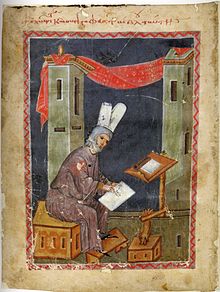|
Niketas Choniates
Niketas or Nicetas Choniates (Medieval Greek: Νικήτας Χωνιάτης; c. 1155 – 1217), whose actual surname was Akominatos (Ἀκομινάτος), was a Byzantine Greek historian and politician. He accompanied his brother Michael Akominatos to Constantinople from their birthplace Chonae (from which came his nickname, "Choniates" meaning "person from Chonae"). Nicetas wrote a history of the Eastern Roman Empire from 1118 to 1207. LifeNicetas Akominatos was born to wealthy parents around 1150 in Phrygia in the city of Chonae (near the modern Honaz in Turkey). Bishop Nicetas of Chonae baptized and named the infant; later he was called "Choniates" after his birthplace. When he was nine, his father dispatched him with his brother Michael to Constantinople to receive an education. Niketas' older brother greatly influenced him during the early stages of his life. He initially secured a post in the civil service, and held important appointments under the Angelos emperors (among them that of Grand Logothete or Chancellor) and was governor of the theme of Philippopolis at a critical period. After the sack of Constantinople during the Fourth Crusade in 1204, he fled to Nicaea, where he settled at the court of the Nicaean emperor Theodore I Lascaris, and devoted himself to literature. He died in 1217. His theological work, Thesaurus Orthodoxae Fidei, although extant in a complete form in manuscripts, has been published only in part. It is one of the chief authorities for the heresies and heretical writers of the 12th century. Choniates in fictionUmberto Eco's novel Baudolino[1] is set partly at Constantinople during the Crusader conquest. The imaginary hero, Baudolino, saves Niketas during the sacking of Constantinople, and then proceeds to confide his life story to him. Niketas is a major character in Alan Gordon's murder mystery A Death in the Venetian Quarter (New York: St. Martin's Minotaru, 2002). Editions and translations
References
Further reading
External links
|
||||||||||||||||
